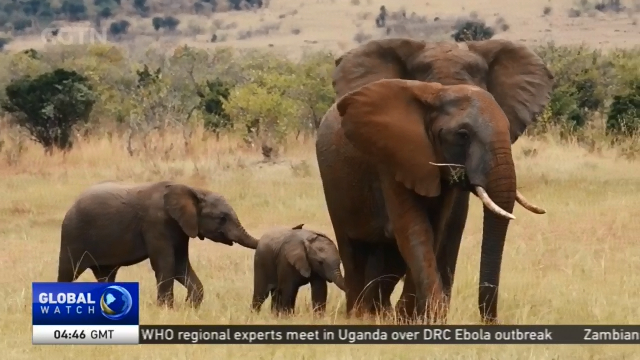
15:41, 26-Sep-2018
Protecting Elephants: Chinese firm & NGO awards Kenyan ranger
Updated
15:06, 29-Sep-2018
03:48

On the great plain of Maasai Mara in Kenya, there are about 500 rangers. They are tasked with protecting wild animals there. Recently one of them has earned an acknowledgment from China, for his contribution in protecting a magnificent kind of beast: the elephant.
The elephants. It takes about 20 years for them to reach adulthood. But now, they are dying by the hour. Over 100 thousand elephants have been slaughtered in the past 3 years for their ivory. With the population virtually wiped out in Western Africa, poachers are turning to countries like Kenya. At this rate of killing, half the elephants in Africa could be gone within a decade. But the Maasai Mara National Reserve feels a world away from the crisis outside. We met the zone CEO Brian Heath.
BRIAN HEATH, CEO THE MARA CONSERVANCY "In 2011, 2012, about 140 elephants were poached. Not in the park, but in the area surrounding the park. Last year I think it was eight."
This NGO is licensed by the government to manage the area.
BRIAN HEATH, CEO THE MARA CONSERVANCY "When we first came here, there was a lot of insecurity. There was a lot of poaching."
Then they hired rangers, which made a big difference. The reserve's tourism warden, Alfred Bett, explained how rangers work.
ALFRED BETT, TOURISM WARDEN THE MARA CONSERVANCY "They can sit in the office in the morning, they discuss where they can go for patrol. Where they think there is a possibility of illegal activities. And they walk inside the forest."
That's a dangerous job. Because all poachers have weapons, and when exposed, they're not hesitant to use them.
YANG CHENGXI MAASAI MARA, KENYA "That is a tough battle to fight. Because according to a 2016 report, 82 percent of rangers in Africa have faced life-threatening situations on duty. And about 62 percent of them had been attacked by poachers in the past."
Despite the hardship, the rangers have successfully kept the area poaching free. 50 thousand animal wire traps used for poaching have been dismantled. Dogs are equipped at major checkpoints.
ALFRED BETT, TOURISM WARDEN THE MARA CONSERVANCY "There work is basically to sniff if there is any ammunition, if there is any rifle, if there is any trophy, either the tusk or the rhino horn."
The NGO turned the place into a popular tourist attraction. However, with more and more safari cars roaming the area, the growing challenge is to keep the animals undisturbed. Nevertheless, this is much easier than battling gun-wielding poachers. Bett's contribution has earned him an acknowledgment from China. Tech company Alibaba and NGO Paradise Foundation have jointly set up a fund where they award 50 rangers a year for 3000 US dollars. Bett is this year's recipient.
ALFRED BETT, TOURISM WARDEN THE MARA CONSERVANCY "China is now playing a very important role. We used to think China is the best marketplace for animal trophies. But now, they stopped it."
By banning the sales of ivory in 2017, China has seen a big turnaround in its role in the global ivory trade. The decision will hopefully diminish the market and discourage poaching. The Maasai Mara reserve is but a small safe haven on the African continent. Protecting the vast elephant population here needs a global political and economic solution. To Mr. Bett, it is a good thing that China is stepping up to be part of that. YCX, CGTN, MAASAI MARA, KENYA.

SITEMAP
Copyright © 2018 CGTN. Beijing ICP prepared NO.16065310-3
Copyright © 2018 CGTN. Beijing ICP prepared NO.16065310-3